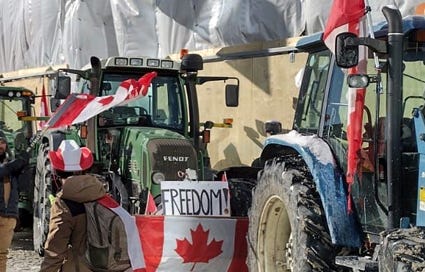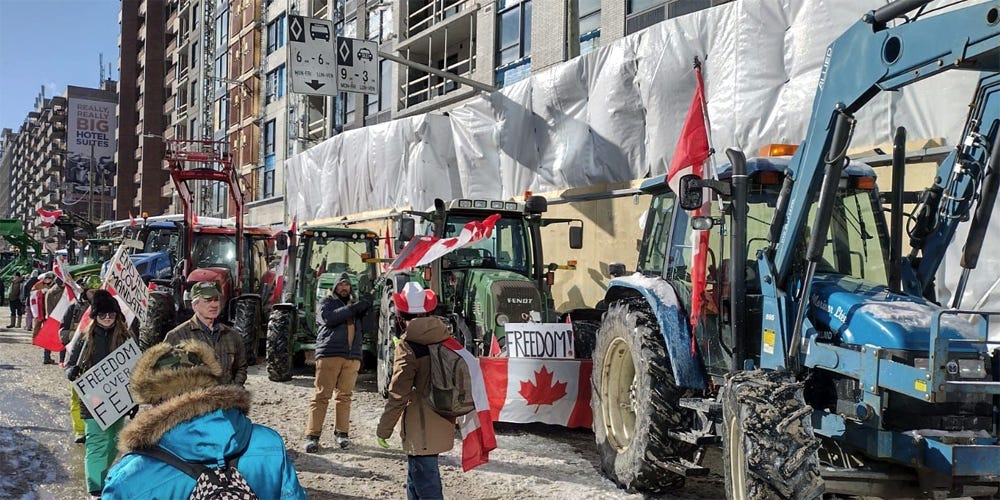"I was one of the guys who brought the tractors in," says Martin, a Quebec grain farmer whose first language is German. "We got them in at three in the morning," on the second Saturday. "The police have shift change at two o'clock, right. It's kind of a quiet time. We had no flashers, no beacon lights on."
In La Belle Province, tractors must display government-issued license plates, but Martin removed his back at the farm. 200 meters (650 feet) short of their destination, “The police stopped everything. We argued with them for about an hour. The staff sergeant came up, and one higher up came up. They tried to tell me to take our 150 tractors to Coventry" - the baseball stadium parking lot.
"I said, 'No, we're staying. We bring 'em in here, we do it safe, good. Everything is fine. Or I take all the keys out and leave 'em right now where they are in the intersection. It's up to you guys.'" Finally, a senior officer agreed. Most of those tractors stayed for two nights, and then returned home.
Martin had already been in Ottawa for a week. The previous Saturday, he says, when folks from all corners of the country were converging on the capital,
we got our trucks going, a whole convoy from Quebec, down from the Pontiac, around the Ottawa River, into Gatineau. We got stopped at the Alexandra Bridge. You couldn't go any further. You had to walk across. A lot of people came the first weekend, it was just wild.
Once there, he found himself thinking "I gotta bring my tractors down." Mid-week, he and a few friends drove a handful into the city, and began organizing the Saturday event. "I have plenty of time in the winter," he explains. "I had a young guy working with me, he stayed at the farm. I was basically camping out in Ottawa. I went home some nights to get a shower, to get some fresh clothes."
By then, Martin was helping supply the parked semis with diesel. "There was a trailer on Wellington Street," he says, amongst the three lanes of densely-packed trucks. "They built a staircase" at the back of it. "You could go at night, if you need it, to get one or two Jerry cans. It was literally full with Jerry cans."
One of Martin's relatives had intended to donate $5,000 to the Convoy online, but changed his mind when rumours began swirling about funds being frozen. "He give me the cheque and I went and bought fuel. We had tanks parked in Quebec." On a farm closer to Ottawa than his own, he says, yet still "in the boonies."
"My fuel supplier delivered it. He brought the tanks down with a crane. We wouldn't let anybody into that fuel supply depot except us three guys. Three guys knew where it was. Then we started bootlegging fuel into Ottawa."
Filling 500-800 litre (130-210 gallon) slip tanks in the back of pickups, they brought in fuel late at night or early in the morning. “We drove right into downtown, we never got caught. I got in passing 50 cops with a full fuel tank on the back."
Part 2: Regular Canadians vs the Media







Yea Martin! What an inspiring story. Interesting to hear how all that fuel got to the truckers. Love the protest of taking keys and leaving tractors right where they were! A Canadian Gandhi.. no violence but so effective.. just wonderful you are documenting these details Donna..and so grateful to Martin for his contribution.